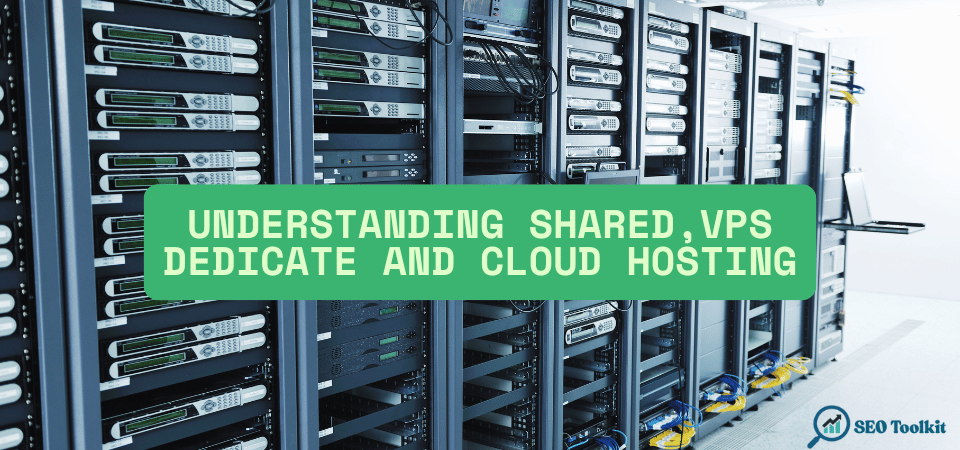
Understanding Shared, VPS, Dedicated and Cloud Hosting
Let's talk about web servers and how your website actually lives on the internet. Imagine your website is a book and the internet is a giant, worldwide library. A web server is essentially the bookshelf (or even the entire library building) where your book (website) is stored.
When a person enters your website address into their computer, the server receives a message from their computer. The server then quickly locates your website's files (including all the text, images, videos and code) and sends them back to the visitor's browser so they can view it. It is available 24/7, ready to deliver your site to anyone, anywhere, at any time.
There are many different ways to host your site on a site, just like there are various ways to store books in a librarian, from having your own personal wing to sharing a shelf. This break down the main categories:
1. Shared Hosting
Consider living in a large room complex as part of shared hosting. You own your own apartment but you also share the building's resources, such as the electricity, plumbing, internet access and even the common areas with many other visitors. Your website lives on a single powerful server alonside hundreds sometimes thousands of other websites. You all have access to the server's processing power, memory and storage space.
It's incredibly simple to set up and maintain, frequently with helpful control panels. Great for small business websites, personal blogs or portfolio that don't receive a lot of visitors. It's usually the cheapest option because you are splitting the cost with so many others.
If one "neighbor" (another website on the same server) gets a sudden rush of visitors, it can slow down your website because resources are shared. You have limited access to the server's settings as changing things might affect others. If one site experiences a safety issue, it could have an impact on others website.
2. VPS (Virtual Private Server)
It's similar to owning a condominium system in the same apartment building with a VPS. You're also with other people in a building but your unit is entirely independent. Even if your relatives are having a party, you have your own dedicated part of the property's resources such as your own plumbing, electrical section and a certain amount of space.
It's similar to owning a condominium system in the same apartment building with a VPS. You're also with other people in a building but your unit is entirely independent. Even if your relatives are having a party, you have your own dedicated part of the property's resources: your own plumbing, electrical section, and a certain amount of space.
A strong physical server is divided into several smaller, dispersed "virtual" servers. Each VPS behaves like its own distinct server, using its own dedicated part of the physical server's resources (CPU, RAM and storage) as its own. You receive your very own "virtual" operating program.
When your site starts receiving more traffic or requires more dependable efficiency than shared hosting can offer, you'll need to upgrade VPS. You can deploy custom software and have much more power over the server environment. You'll need a bit more technical knowledge how to manage a VPS, though many hosts offer "managed VPS" plans to help. It costs more than shared hosting because you get more dedicated resources.
3. Dedicated Hosting
Dedicated hosting is similar to having your own private island or building entirely dedicated to your website. Nothing that you share with anyone else is yours. Your overall physical server is entirely yours. You lease the hosting provider the overall physical server. You have complete control over every aspect of its resources, including CPU, RAM, store, speed and you are entirely responsible for all of them.
Greate for High-traffic e-commerce sites, massive media portals or sophisticated web applications that demand the best performance and reliability. You are in complete control of all security measures and are unaffected by "noisy neighbors". This option is advanced, it costs more than Shared and VPS.
You'll need to be an experienced system administrator or work with one because you'll be in charge of all server maintenance, security and management (unless you choose to use a "managed dedicated server").
4. Cloud Hosting
Opening in sky is a little bit different. Your website is hosted on a network of interconnected servers rather than one physical or virtual server. Imagine having your website's statistics distributed among several data centers, set to be retrieved from the one that is currently performing best.
The data on your website are distributed across many different machines that are connected together. Another client instantly assumes control if one goes offline. The sky system is immediately allocate more resources to solve it if your website immediately experiences a significant surge in traffic.
Great for websites that experience unexpected visitors spikes or those that require rapid growth. You only receive payment for the solutions you actually use. If one server fails, your website stays online while another cloud servers take care of the load.
etting up a pay-as-you-go billing system does require some expertise. While adjustable traffic can be cost-effective, persistently high traffic websites could cost more than a dedicated server.
Which one is right for you?
The correct web server type actually depends on the needs, the budget and the level of technological comfort of your website:
Start with Shared: If you are new, have a little personal website or have a limited budget.
Walk to a VPS: if you want better functionality, more command or more control without the cost of a dedicated server.
Move Dedicated: If you have a huge, high-traffic website that requires peak performance and control and cannot afford downtime.
Consider Cloud: If your visitors is unexpected, you need extreme reliability or you want to have a global reach and rapid growth.
Understanding these choices will help you choose the ideal online home for your site, making sure it runs efficiently and is accessible to all of your visitors.



